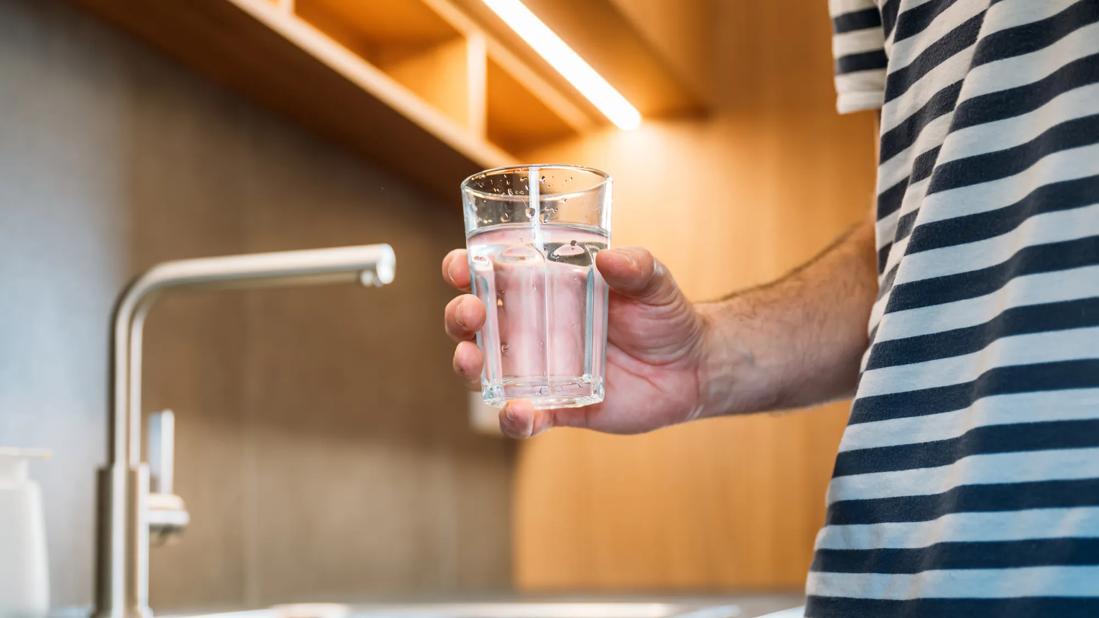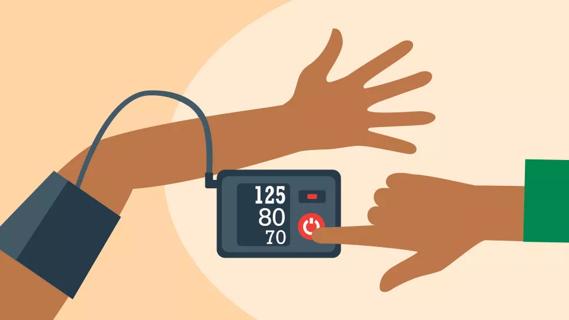Elevate your BP by lying down, drinking water or cooling off

Worries about blood pressure typically involve it running too high. But did you know that low blood pressure — especially when it drops suddenly — can be equally concerning and even dangerous?
Advertisement
Cleveland Clinic is a non-profit academic medical center. Advertising on our site helps support our mission. We do not endorse non-Cleveland Clinic products or services. Policy
Heart rhythm specialist Jeffery Courson, DO, explains what can happen when your BP bottoms out and — more importantly — how you can nudge it back up.
An ideal or “normal” blood pressure (BP) is at or just below 120/80 mmHg. Blood pressure at or below 90/60 mmHg is considered low, or hypotensive. (Learn more about what those numbers mean.)
A sudden and dramatic drop in blood pressure into that low zone can happen for many different reasons, but the symptoms look similar across the board, says Dr. Courson. If your blood pressure has plunged too low, you may:
Here are seven things you can do to help elevate your BP if it falls too far.
Lying down can bring an immediate bump in blood pressure. The reason? When you’re horizontal, your blood vessels don’t have to fight gravity as much as they do when you’re standing.
Your body knows this intuitively, too. That explains why a sudden drop in BP can cause you to pass out, or faint (syncope), as a forced reset. It’s basically a physiological version of hitting CTRL + ALT + DEL on your computer.
Advertisement
So, if you feel like your blood pressure’s dropping and you might faint, change positions from standing to sitting to lying down.
“Not only does changing your position raise your blood pressure and make you less likely to faint, it also means that — if you do pass out — you will be less likely to fall and hurt yourself,” says Dr. Courson.
Still, be aware of your surroundings and try to avoid stairs, tile floors and other hard surfaces if you’re feeling shaky.
Your blood is mostly water. If you’re dehydrated, that lack of fluid in your body reduces your blood volume. Less blood in your system leads to a drop in blood pressure because your blood vessels aren’t as full.
Think of it like your garden hose: If there’s not much water coming from the spigot, there’s not much pressure in the line.
“When your body’s properly hydrated, it does a better job of regulating your blood pressure,” Dr. Courson explains. “If your blood pressure is low, drinking fluids can raise your blood volume and improve circulation.”
If your blood pressure dips too low, activating your muscles can coax it back up. There are a few different ways you can do this:
The squeeze supplied by compression garments can bump up low blood pressure.
Whether you’re wearing compression leggings or an abdominal binder, the pressure they put on your body promotes better circulation. That means less blood pooling in the veins in your lower body — which means more blood making its way back to your heart with every beat.
If you’re at home and start feeling off, putting on compression therapy gear may stop a BP plunge, notes Dr. Courson. If you’re prone to sudden dips in your blood pressure, it’s a good idea to keep compression wear stored in your car, office or bag.
The jolt delivered by a cup of coffee may help raise blood pressure that has sunk too low.
One caveat, though: Caffeinated coffee doesn’t have the same effect on everyone. How much you routinely drink, your DNA and a whole host of other factors can affect how you metabolize your java.
So, if you’re one of those people who guzzles coffee by the pot … well, it’s unlikely to be a super effective tool for raising BP in a pinch, states Dr. Courson.
When you’re hot, your blood vessels expand. These widened vessels essentially slow down circulation and allow gravity to more easily pull blood toward your feet and away from your brain.
Advertisement
If you feel overheated and woozy, finding a cooler location to rest and lower your temperature may bring your BP back up, suggests Dr. Courson. Grab a drink of water while you’re at it, too.
We’ve all heard of people passing out in a moment of grief, anguish or surprise. Ditto the sight of blood or needles. It’s called “situational syncope,” and it’s basically your body’s way of trying to protect you from emotional distress.
If you’re upset enough that it’s starting to affect you physically and lower your BP, sit or lie down and do some deep and relaxing breathing exercises, like:
The consequences of sustained low blood pressure can be deadly, cautions Dr. Courson. A dramatic drop in blood pressure can reduce the amount of blood getting to your organs. If they’re starved of oxygen for too long, it can cause your body to go into shock.
How low is dangerously low? According to Dr. Courson, it depends on what you consider a “normal” blood pressure, as your levels naturally fluctuate throughout the day.
A sudden drop in blood pressure of just 20 mmHg is enough to make a person pass out. In other words, if you have chronic high blood pressure, dropping to a “healthy” level all of a sudden could count as a hypotensive crisis.
Advertisement
For that reason, it’s best to focus on the kind and severity of the symptoms you’re experiencing, not a specific number on a blood pressure monitor.
While occasionally lower BP isn’t necessarily a problem, a sudden episode of severe hypotension should be treated as a medical emergency. Call 911 or your local emergency services number if the following happens suddenly and without explanation:
Also, if you’ve had multiple attacks of low blood pressure, contact a healthcare provider. They can run tests to help you figure out what’s triggering those dips. They can also make suggestions for managing hypotensive episodes when they happen.
Low BP that’s left untreated has the potential to do permanent damage over time, after all. Chronic low blood pressure needs monitoring, attention and treatment just like high blood pressure.
“If you’re on the fence about getting help, it’s best to err on the side of caution,” advises Dr. Courson. “When in doubt, make the call.”
Advertisement
Learn more about our editorial process.
Advertisement

Foods high in potassium, calcium and vitamins C and E can help lower your blood pressure

Making lifestyle changes can help reduce your blood pressure, but taking cinnamon supplements probably isn’t one of them

Hypertension strains your heart and blood vessels, causing damage that can contribute to heart attacks

Daily stressors can increase BP in the moment, as well as contribute to habits that can feed long-term hypertension

Moderation is best when consuming caffeinated drinks to avoid unhealthy spikes in BP

Medication, exercise and diet changes can all help

An ideal blood pressure is less than 120 mm Hg systolic and less than 80 mm Hg diastolic

While not magic elixirs, some drinks like beet juice and skim milk may help keep numbers down

Wearing a scarf, adjusting your outdoor activities and following your asthma treatment plan can help limit breathing problems

Your diet in the weeks, days and hours ahead of your race can power you to the finish line

When someone guilt trips you, they’re using emotionally manipulative behavior to try to get you to act a certain way